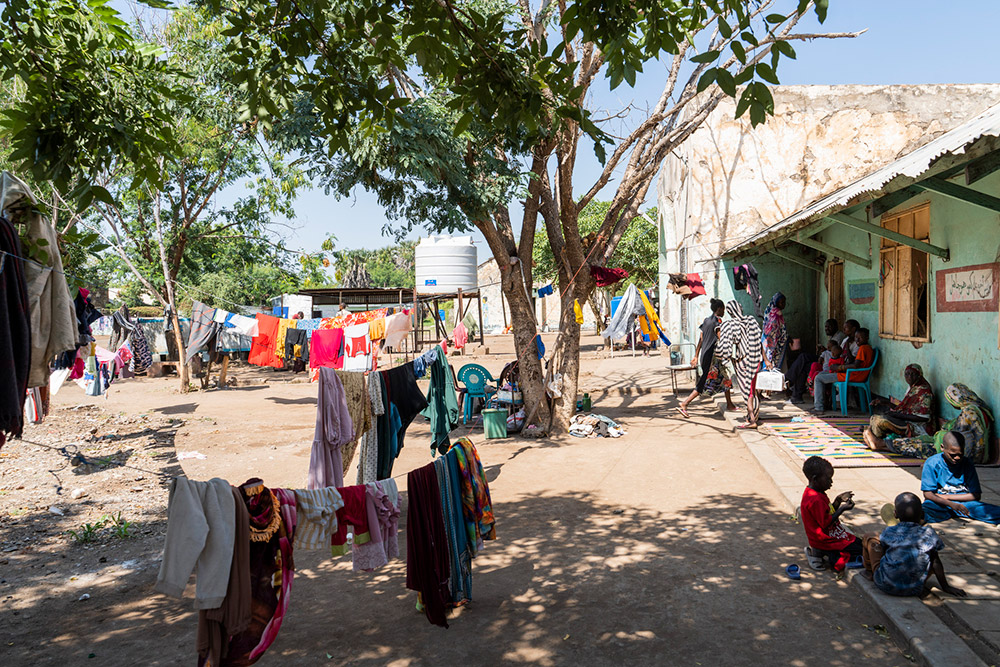 Internally displaced families living in Algadeema School in Gadaref on 23 October 2023. Photo credit: WHO/Ala Kheir
Internally displaced families living in Algadeema School in Gadaref on 23 October 2023. Photo credit: WHO/Ala Kheir
Briefing by Mr Peter Graaff, acting WHO Representative to Sudan, at the Palais des Nations media briefing session.
13 February 2024, Cairo, Egypt – It has been 10 months since conflict erupted in Sudan, plunging the country into a humanitarian crisis of epic proportions.As the fighting spreads to new areas, civilians continue to be displaced en masse, some of them multiple times.
Sudan is now the largest displacement crisis globally, with nearly 8 million people displaced due to the ongoing conflict – 6.1 million have been displaced internally and about 1.8 million into neighbouring countries.
I have witnessed first-hand the displacement within Sudan and in neighbouring Chad. And what I have seen is alarming and heart-breaking. People are forced to walk for days to flee the violence; most of them are women and children. When they find shelter, it is often in overcrowded areas that lack access to safe water and sanitation, food, and the most basic health services.
About 25 million people in Sudan need humanitarian assistance, 18 million of whom are facing acute hunger – 5 million at emergency levels of hunger. There is concern that the upcoming lean season will lead to catastrophic levels of hunger in the worst-affected areas. It is projected that in Darfur alone, 200 000 children will suffer from life-threatening hunger this year.
Disease and malnutrition have a synergistic relationship: hunger weakens the body’s defences and opens the door to disease, increasing morbidity and mortality. Malnourished people, particularly pregnant women and children, experience the worst outcomes of disease. Malnourished children are at increased risk of dying from illnesses like diarrhoea, pneumonia and measles, especially in settings where they lack access to life-saving health services.
The situation in Sudan is therefore a perfect storm as the health system is barely functional, the childhood immunization programme is breaking down and infectious diseases are spreading. More than 10 000 cases of cholera have been reported, as well as 5000 cases of measles, about 8000 cases of dengue and over 1.2 million clinical cases of malaria.
Insecurity and bureaucratic hurdles continue to impede humanitarian access. The people of Sudan are facing a life-or-death situation due to the ongoing violence, insecurity and limited access to essential health services and supplies. And there seems to be little hope of a political solution in sight. In fact, previously safe areas like Wad Madani are now considered hard to reach. The areas that are most in need, like Darfur and Kordofan, are the areas that are least accessible. We stand ready to provide life-saving health services and supplies. But to do this we need safe and unhindered access.
WHO is scaling up on-the-ground efforts, including in safely accessible areas and through cross-border operations, to deliver the health emergency response, respond to disease outbreaks, sustain disease surveillance and provide life-saving medical supplies and equipment. This includes embarking on strong cross-border operations to reach previously unreachable areas in Darfur and Kordofan, where the need is greatest.
As we speak, our teams are delivering 58 metric tonnes of medical supplies, including emergency health supplies, and supplies for the management of chronic diseases, injuries and emergency surgery, which will support the health needs of 338 100 people. In total, since the eruption of the conflict, WHO has delivered 1750 metric tonnes of supplies to Sudan.
But there is so much more that can be done. For this, we need the international community’s commitment, including strong advocacy for unhindered access for humanitarian partners, and the financial resources to rapidly scale up the response in Sudan. The need is huge but so too are our commitment and resolve.








